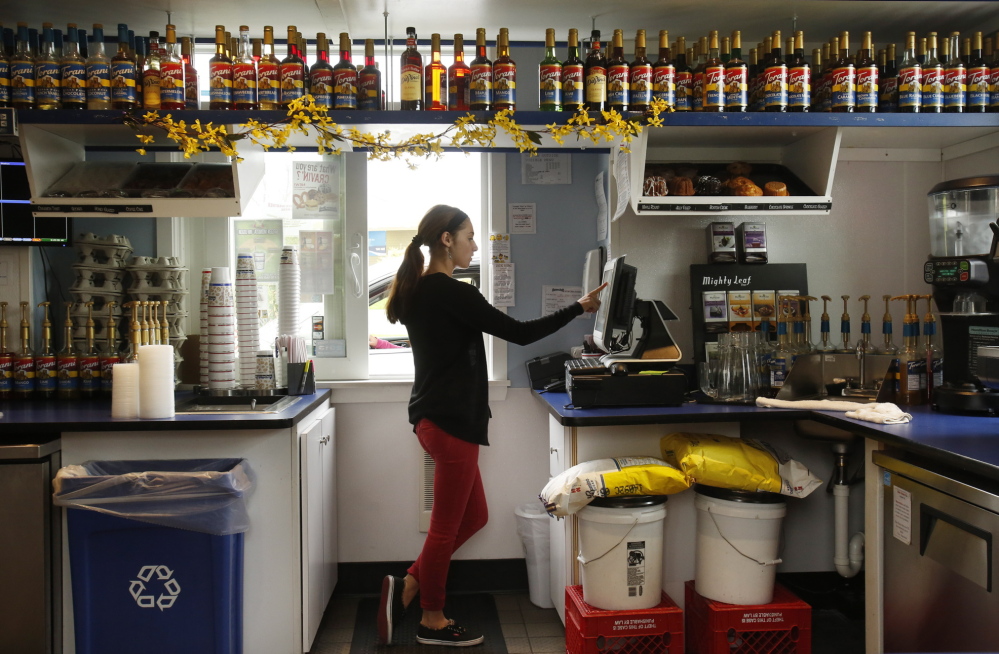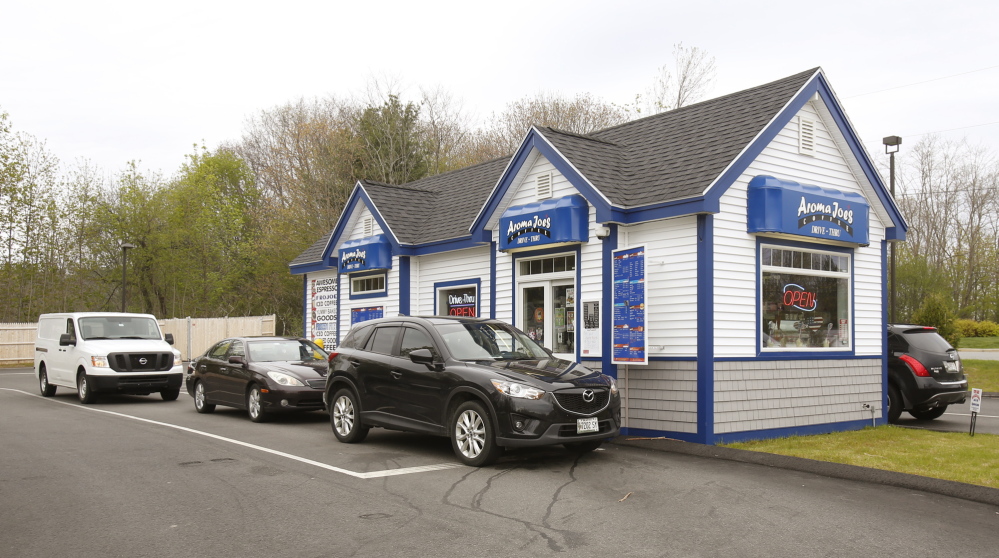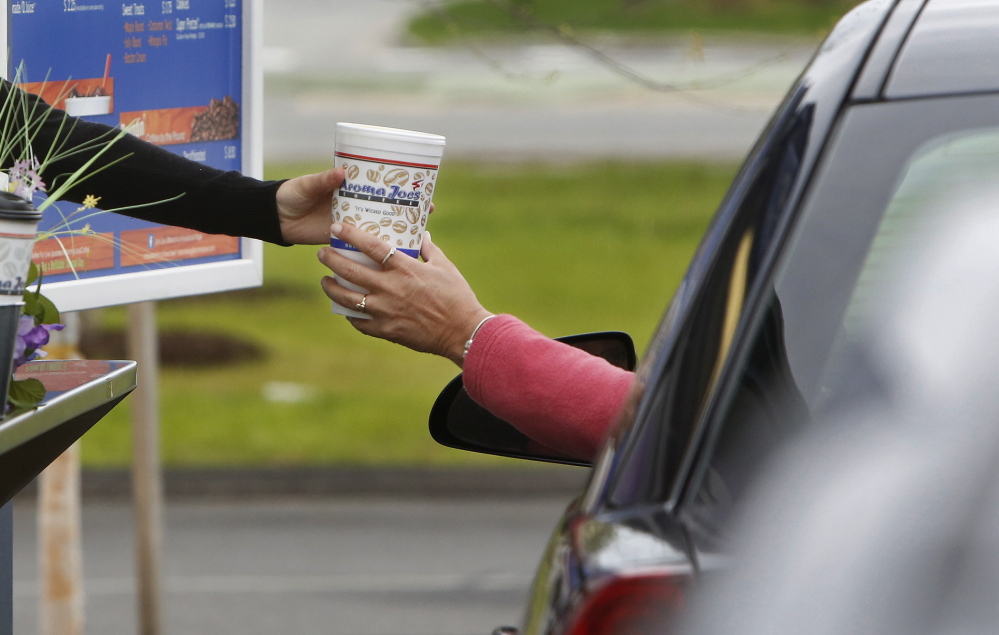No intercoms. No mistakes. No attitudes.
Those three laws of service at Aroma Joe’s Coffee have helped propel the drive-thru coffee company from its first kiosk in a New Hampshire parking lot in 2000 to its plan to have 250 locations by 2020. The Portland-based chain currently has 19 founder-owned locations and three franchised locations.
“Dunkin’ Donuts is what we grew up on. Now people are looking for different options, different flavors,” said co-founder Marty McKenna. “We have a mission of providing a wicked good cup of coffee to one customer at a time. That mission allowed our brand to grow in a tough coffee market.”
McKenna said Aroma Joe’s has maintained its competitive edge in the market through quality service and training employees to know their customers by name and their favorite drink.
“It’s a ‘Cheers’ mentality – everyone knows your name. We don’t ever want you to be a squawk at a squawk box. There’s personal interaction beyond people just taking your money and handing you a drink,” McKenna said.
The founders of Aroma Joe’s include two sets of brothers born and raised in Berwick: Marty and Tim McKenna and their cousins Brian and Mike Sillon.
“Early on, working with family was a little bit of a challenge. We’ve always gotten along, but we’ve had a few moments here and there. We’ve learned to work together. With four partners, it forces us to have three of four agree to make a decision. Majority rules before we make any major move,” Marty McKenna said.
So far, Aroma Joe’s has concentrated its locations in Maine and New Hampshire. Starting next month, Aroma Joe’s will have locations in northern Massachusetts and Vermont. It expects to have 40 locations by year-end.
Its kiosk model offers the lowest overhead while at the same time providing the opportunity to capture the greatest sales volume possible, McKenna said. Aroma Joe’s has six locations with seating, including one at the University of New Hampshire, the only spot with no drive-thru component.
“We prefer drive-thrus, but we’re open to doing sit-down locations in the right spot,” McKenna said.
McKenna said Aroma Joe’s isn’t shy about going head-to-head against Dunkin’ Donuts or Starbucks and locating across the street from the coffee giants.
“It’s more about all the traffic in the area and the number of rooftops – population density – than any concern about competition,” McKenna said. “We look for locations that have easy-in, easy-out access and great exposure from the road. We try to pick great sites.”
Aroma Joe’s said it has drinks and food to appeal to all ages, but it performs most strongly in the 16- to 30-year-old demographic.
“We’re not your mom-and-dad’s coffee company. We have a younger crowd. There’s a whole new generation of coffee drinkers that have different tastes,” McKenna said. “We can make a white chocolate iced coffee, or a peanut chocolate iced coffee that’s to die for. The coffee market has evolved from a regular coffee and doughnut to be more of a scone and peanut butter, marshmallow iced coffee or s’more iced coffee.”
Aroma Joe’s has 55 different flavored syrups that allow customers to concoct their signature drinks, McKenna said.
McKenna’s signature drink? In the morning, it’s Aroma Joe’s medium black house blend. In the afternoon, it’s a “beach bum” flavored Rush energy drink.
The U.S. coffee shop industry had about 22,000 stores with combined annual revenue of about $12 billion in 2013, according to First Research. About 70 percent of sales are generated by the top 50 chains nationally.
Aroma Joe’s busiest time of year is July and August, driven by demand for iced coffee. Its energy drinks are most popular near high schools and colleges, McKenna said.
Aroma Joe’s previously offered Red Bull energy drinks, but high demand drove it to develop its own brand. It went through several formulas and finally developed a line of Rush energy drinks, which have been a boon for the company, McKenna said.
Rush represents 23 percent to 25 percent of sales at Aroma Joe’s locations, McKenna said. Nationally, energy drinks had $9 billion in sales in 2013.
The company also has been selling Rush at some retailers and will begin promoting Rush at bars and restaurants this summer, he said.
Sales of energy drinks have surged nationally. In 1999, coffee sales trumped energy drink sales 36-to-1. That gap closed significantly by 2013, when the ratio was about 1.5 cups of coffee to one energy drink, according to research firm Euromonitor. Sales of energy drinks are expected to grow at twice the rate of coffee sales over the next five years, Euromonitor pre- dicted.
Aroma Joe’s also tweaked its food offerings to satisfy customer requests for more options. Aroma Joe’s introduced a new breakfast menu in March and added more snacks to its menu. Food currently represents 12 percent of sales, McKenna said.
“It was one area we realized we could do better. Our customer base kept asking for food. It was our job to meet that demand,” McKenna said.
A NEW PARTNERSHIP
After about 12 years in business, the four founders started considering ways to accelerate growth. They had been approached by Franchise Brands LLC, which was created in 2005 by the Subway sandwich chain, about helping them sell franchises of Aroma Joe’s.
“Subway came to us and said ‘We love what you’re doing. We’d like to partner with you on franchising,’ ” McKenna said. “It’s been a big success. Now, we have the full weight of Subway behind us to help us get better vendor pricing on cups, lids, marketing, legal services, branding.”
Subway didn’t offer to buy out Aroma Joe’s, but instead was focused on forming a franchising partnership.
Subway and Aroma Joe’s have both brands in some locations, such as Ossipee, New Hampshire. For most locations, however, Franchise Brands helps Aroma Joe’s sell the franchising rights for a single kiosk.
Loren Goodrich, a Subway franchisee in Maine, opened a dual-branded site in South Berwick with Aroma Joe’s.
“That’s when I learned about the strength of the Aroma Joe’s brand,” Goodrich said. “We look at them to do some co-branded locations, but Aroma Joe’s stands very well on its own. We put them in locations where they can thrive as a stand-alone entities.”
Goodrich said the partnership is being very selective about franchisees.
“About 500 people contact us about each franchise location. It’s a very unique company and we’re trying to be very careful about our choices. It’s very scripted growth,” Goodrich said.
Goodrich sees the growth potential of Aroma Joe’s as unlimited.
“Ultimately, if will be worldwide. That’s the plan,” Goodrich said. “Subway’s in 103 countries. We think we can offer Aroma Joe’s brand in all those countries,” Goodrich said.
“Aroma Joe’s offers a unique, differentiated experience. It’s eye-to-eye, face-to-face ordering. That means there’s fewer chances to make mistakes and Aroma Joe’s baristas forge a relationship with the customers,” said Goodrich, who said each opening for a barista draws about 200-300 applications.
The four founders of Aroma Joe’s have no plans to sell the company, McKenna said.
“We’re committed to see the business expand. We created the core values of the brand. We have no plans to exit,” McKenna said. “We love what we do.”
Jessica Hall may be reached at 791-6316 or at:
jhall@pressherald.com
Twitter: @JessicaHallPPH
Send questions/comments to the editors.





Comments are no longer available on this story